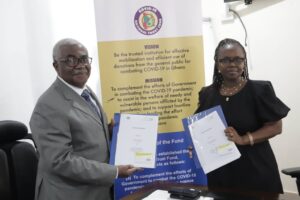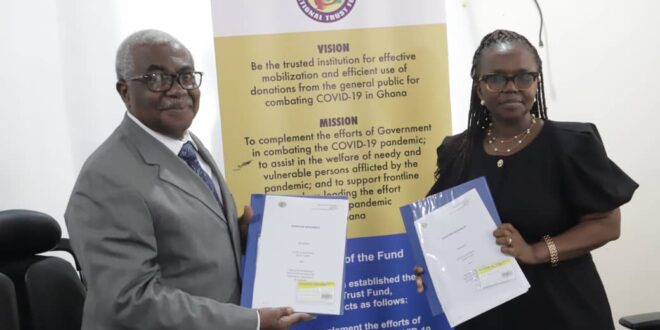
The COVID-19 National Trust Fund Tuesday donated GH¢2.2 million to the Noguchi Memorial Institute for Medical Research (NMIMR), University of Ghana, to conduct research into the effect of COVID-19 vaccines on Ghanaians.
The research, which is to be carried out in 18 months, would measure, compare and establish the durability of immune responses elicited by the three different vaccines- AstraZeneca, Pfizer and BioNTech- administered within the Ghanaian population.
At a donation signing agreement at the COVID-19 National Trust Fund Secretariat at the Jubilee House, Accra, Dr William Collins Asare, Administrator of the Fund, said the Trust Fund identified the NMIMR as an important stakeholder in the search for domestic solutions to the pandemic.
He said the partnership between the two institutions would contribute to the generation of data to inform the effectiveness of the vaccines that have been administered within the Ghanaian population.
Dr Asare who noted that with the current possibility that COVID-19 vaccines may be required periodically to remain immune to the virus, was optimistic that the outcome of the research would lead to the development of home-grown solutions in the fight against the pandemic.
It would also generate vital information to support the country’s health system and inform policy on which vaccine should be given priority in procurement and utilization.
He urged the NMIMR to adhere to the provisions in the donation agreement and complete the research at the stipulated time.
Professor Dorothy Yeboah Manu, Director, NMIMR, who initialed the agreement for the Institute, expressed appreciation for the donation.
She said the timely gesture was crucial to the work being undertaken by the Institute to determine the frequency of vaccine shots necessary to maintain immunity against COVID-19 over time and inform policy at the national level.
Prof. Yeboah Manu gave the assurance that the research findings would be delivered by the deadline given the Institute to lend boost to the national effort to curb the COVID-19 disease.
Source: GNA




















Discussion about this post